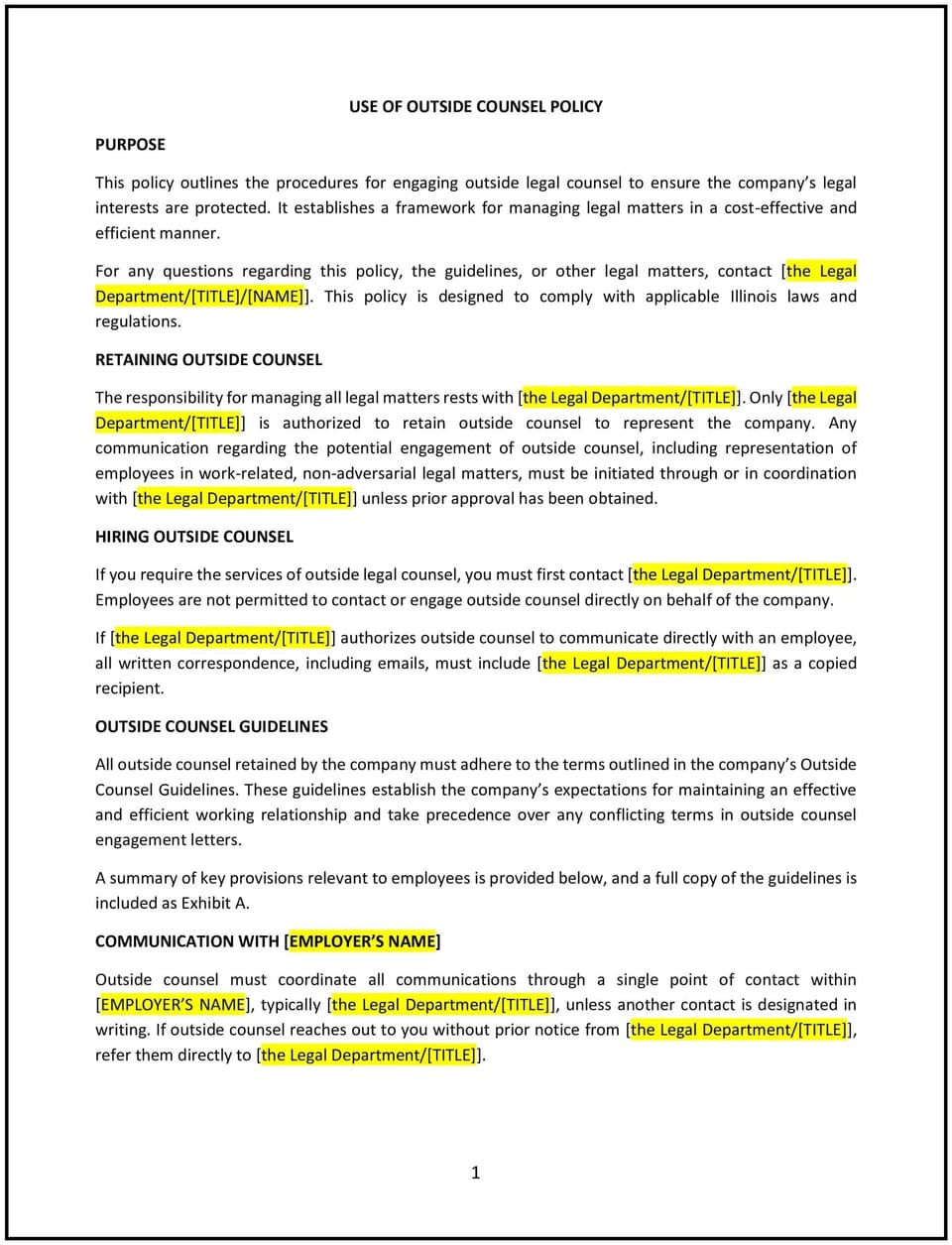Use of outside counsel policy (Illinois): Free template

Use of outside counsel policy (Illinois)
This use of outside counsel policy is designed to help Illinois businesses manage their engagement with external legal counsel effectively. It establishes guidelines for selecting, retaining, and working with outside counsel to address legal matters, strengthen compliance with Illinois and federal laws, and manage legal risks.
By adopting this policy, businesses can streamline legal processes, promote cost efficiency, and ensure alignment with their legal and business objectives.
How to use this use of outside counsel policy (Illinois)
- Define appropriate use: Specify the types of legal matters that require the involvement of outside counsel, such as complex litigation, regulatory compliance, or specialized advice.
- Establish selection criteria: Outline requirements for selecting outside counsel, including expertise, experience, and cost considerations.
- Include engagement procedures: Detail the process for retaining outside counsel, such as obtaining internal approvals and drafting engagement letters.
- Address cost management: Specify billing arrangements, such as hourly rates, flat fees, or contingency fees, and include a requirement for detailed invoices.
- Emphasize confidentiality: Require outside counsel to adhere to confidentiality standards and safeguard sensitive business information.
- Promote collaboration: Outline expectations for communication and collaboration between in-house teams and outside counsel.
- Monitor performance: Establish methods for evaluating the performance and effectiveness of outside counsel to ensure value for the business.
- Ensure compliance: Regularly review practices to ensure they align with Illinois laws and company policies.
Benefits of using this use of outside counsel policy (Illinois)
This policy provides several benefits for Illinois businesses:
- Enhances legal support: Ensures access to specialized expertise for complex legal matters.
- Improves cost management: Promotes transparency and efficiency in managing legal expenses.
- Protects sensitive information: Establishes robust confidentiality protocols when working with outside counsel.
- Promotes accountability: Provides a framework for evaluating the performance of external legal counsel.
- Ensures compliance: Aligns with Illinois and federal laws to reduce legal risks and liabilities.
Tips for using this use of outside counsel policy (Illinois)
- Communicate the policy: Share the policy with relevant team members and ensure it is included in company operational documents.
- Train management: Educate managers and decision-makers on how to identify when outside counsel is necessary and the process for engaging them.
- Use engagement letters: Require detailed engagement letters to clearly define the scope of work, costs, and confidentiality terms.
- Track expenses: Implement a system to monitor legal expenses and ensure alignment with approved budgets.
- Update regularly: Revise the policy to reflect changes in Illinois laws, legal practices, or company needs.
Q: When should outside counsel be engaged under this policy?
A: Outside counsel should be engaged for complex legal matters, specialized expertise, or cases where in-house resources are insufficient.
Q: How are outside counsel selected?
A: Selection is based on criteria such as legal expertise, experience, cost efficiency, and alignment with the company’s needs.
Q: What are the expectations for billing?
A: Outside counsel must provide detailed invoices that align with agreed-upon billing arrangements, such as hourly rates or flat fees.
Q: How is confidentiality maintained?
A: Outside counsel must adhere to strict confidentiality standards to protect sensitive business and legal information.
Q: Can the performance of outside counsel be reviewed?
A: Yes, regular evaluations of outside counsel’s performance are conducted to ensure they meet expectations and provide value.
Q: Who approves the engagement of outside counsel?
A: Engagements typically require internal approval from senior management or the legal department, as outlined in this policy.
Q: How often is this policy reviewed?
A: This policy is reviewed annually or whenever significant changes occur in Illinois laws, company needs, or legal practices.
Q: Does this policy apply to temporary legal consultants?
A: Yes, temporary legal consultants are subject to the same standards and procedures outlined in this policy.
This article contains general legal information and does not contain legal advice. Cobrief is not a law firm or a substitute for an attorney or law firm. The law is complex and changes often. For legal advice, please ask a lawyer.


